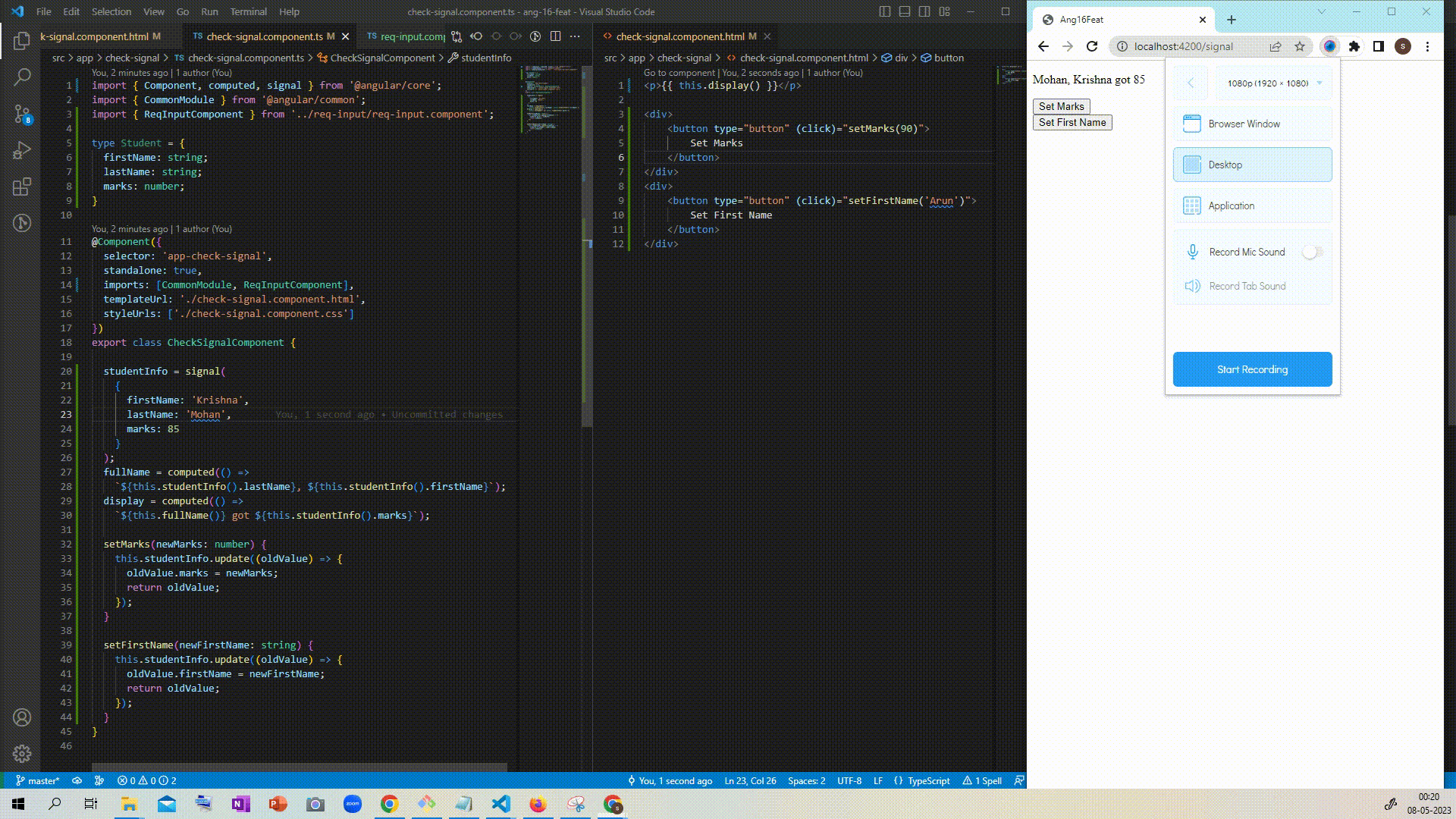Yesterday Angular team released version 16 of their framework and they've termed it as the biggest release since its inception.
Is it? Let's see.
Signals
Angular's current implementation of change detection is bit inefficient as it is based on zone.js. If there is any change in parent component, it will re-render all its child components.
So with this release Angular team introduced a new reactivity model - Signals which may phase out zone.js in the upcoming releases. The concept of Signal is not novel, it is already available in other frameworks like Preact and Solidjs. Right now, it is in developer preview and not recommended for production. It is not a replacement for rxjs, but you can find an immediate use of it by replacing async pipe in templates.
Here are the few functions that'll help you to implement signals:
signal(): will help you to create a writable signal whose value you can set, update and mutate.computed(): will help you to derive or compose value from other existing signals. It will keep track of the signals referenced in the computation.effect(): will help you to add side effects. This passed function will be invoked every time the signal referenced inside it changes.toSignal(): will help you to convert an observable to signal.toObservable(): will help you to convert a signal to an observable.
If you are coming from reactjs background, you may see some similarity with useState() hook. But both are entirely different. Major differences are:
- Automatic dependency tracking in signals
- signals aren't tied to components, they can be used anywhere in an angular application
computedsignals are lazily evaluated.
 Signal example
Signal example
Concept of DestroyRef and new rxjs operator takeUntilDestroyed
DestroyRef will allow to register destroy callbacks for a specific lifecycle scope. This feature is applicable to components, directives, pipes, embedded views, and instances of EnvironmentInjector. Using DestroyRef, it’s possible to create reusable logic that performs necessary cleanup tasks when a scope is destroyed without the need for inheritance. This simplifies the implementation process and reduces complexity.
takeUntilDestroy is especially useful when you want to tie the lifecycle of an Observable to a particular component’s lifecycle.
data$ = http.get('…').pipe(takeUntilDestroyed());
Improved server side rendering (SSR)
A new function provideClientHydration is introduced to enable the non-destructive Angular hydration, along with the provision for http caching. With non-destructive hydration, Angular has the capability of reusing pre-existing DOM structures on the client-side that were initially rendered by the server. This prevents the flicker that occurs when the page is rendered and ready for interaction by users.
With the help of http caching, requests done on the server side are cached and accessible in client side. This is the default behavior, but you can opt out if required.
import {
bootstrapApplication,
provideClientHydration,
withNoHttpTransferCache,
} from '@angular/platform-browser';
// ...
bootstrapApplication(RootCmp, {
// You can opt out of http caching if required 👇
providers: [provideClientHydration(withNoHttpTransferCache())]
});
Read more: PR for provideClientHydration
Angular Compatibility Compiler (ngcc) is no longer available
This means that we'll no longer be able to use View Engine based libraries. The legacy compilation and rendering pipeline View Engine was deprecated in v12 for Ivy. The ngcc (Angular Compatibility Compiler) was a tool used to compile Angular libraries that have been published in the legacy format, which is not compatible with the Angular Ivy runtime, to a format that is compatible with Ivy.
Read more: What is ngcc in Angular Ivy and why is it important?
Deprecated method addGlobalEventListener of EventManger is removed
This method was used to register a global event handler for either window, document or body, but recently not used by the Ivy engine.
Read more: Lifting the Veil: Insights into Angular’s EventManagerPlugin
A new class MockPlatformLocation is now provided by default in tests.
This may replace the use of SpyLocation and RouterTestingModule in tests. There is also a proposal to deprecate RouterTestingModule.
Tests sometimes do not mock out the PlatformLocation and end up affecting real browser state. This can result in a test unintentionally affecting other tests in the suite because the browser state does not usually get reset before the next test runs. Providing MockPlatformLocation by default prevents these types of accidental test leakages.
In addition, not providing MockPlatformLocation by default led to developers needing to add RouterTestingModule to their test suite to avoid the problems above. This module has spy Location providers which prevent those issues. This commit now makes RouterTestingModule obsolete.
Read more: PR for MockPlatformLocation
Strict type checking with ngtemplateoutlet
If the type is not matching, you'll get compile-time error as below.
To fix this you can either - update the interface/type - add $any() type cast function
interface MyContext {
$implicit: string;
// xxx: string; 👈 Add this or
}
@Component({
standalone: true,
imports: [NgTemplateOutlet],
selector: 'person',
template: `
<ng-container
*ngTemplateOutlet="
myTemplateRef;
context: $any({ $implicit: 'test', xxx: 'xxx' }) //👈 add $any() to avoid error with xxx
"></ng-container>
`,
})
export class PersonComponent {
myTemplateRef!: TemplateRef<MyContext>;
}
You can mark component inputs as required.
You'll get compile-time error, if you marked an input as required but not provided.
 Angular required input error
Angular required input error
QueryList.filter now supports type guard functions.
This will result in type narrowing. An example is given below
const foos: Array<'foo'> = queryList.filter((item): item is 'foo' => item === 'foo');
New standalone options in angular CLI
ng new --standalone will create an application based on standalone API without NgModules. Similarly standalone option is added to ng generate for application, components, directives, libraries and pipes.code